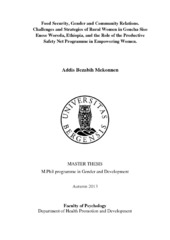Food Security, Gender and Community Relations. Challenges and Strategies of Rural Women in Goncha Siso Enese Woreda, Ethiopia, and the Role of the Productive Safety Net Programme in Empowering Women.
Master thesis
Permanent lenke
https://hdl.handle.net/1956/7815Utgivelsesdato
2013-11-19Metadata
Vis full innførselSamlinger
Sammendrag
The study was designed to explore Food security, gender and community relations. Challenges and strategies of rural women in Goncha Siso Enese Woreda,Ethiopia, and the role of the Productive Safety Net Programme in empowering women. The research applied qualitative methods such as in- depth interviews, Focused Group Discussions and observation to address issues from a gender perspective. The livelihood approach and empowerment approach have been the theoretical frameworks that underpin this study. Findings revealed that access to and control over resources such as natural capital, human capital, financial and social capital is less for female heads of households than it is for married women. The study also revealed that both female-headed households and male headed household are food insecure. Moreover, the study findings indicate that rural women engage in various agricultural activities though there are activities that women are not supposed to engage in due to cultural division of labour. This put women in a more disadvantageous and vulnerable position than men. The study further confirmed that women's labour is considered to have the same value as men's labour in the study area. The role of female-headed households' role in community based activities such as edir, equb, mahiber and other social events is less than married women. As a result, female heads of households have less access to social capital than that of married women. It has also been found out that lack of agricultural resources or capitals (land, labour, credit and saving), lack of social security and unfair division of resources are major challenges for the informants. There are differences among informants' coping strategy. There are also differences between different groups of beneficiaries as concerns their perceptions of the PSNP programme's contributions to their lives and to the community.
